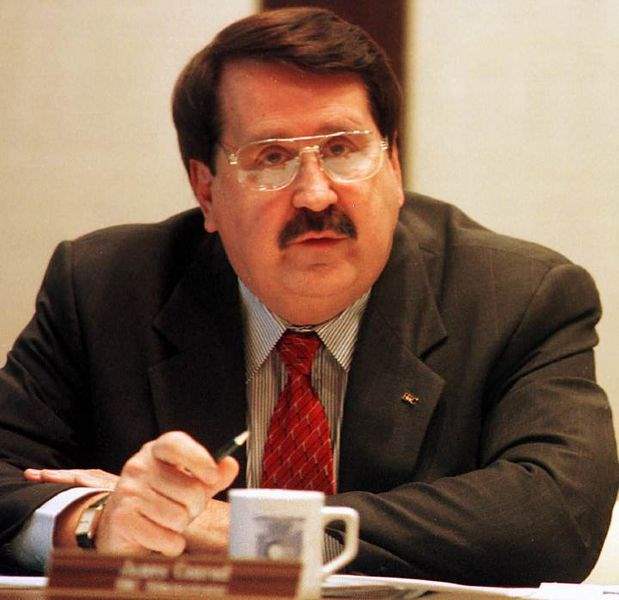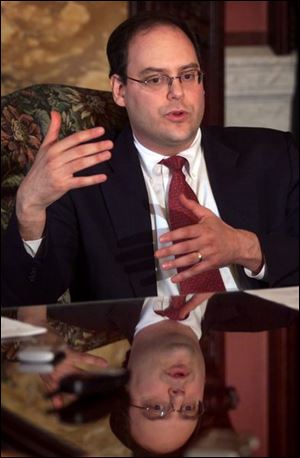
Workers' comp chief seeks law to protect funds; coin investment sparks request
4/27/2005
James Conrad, the head of the Ohio Bureau of Workers' Compensation.
JACK KUSTRON / Associated Press
COLUMBUS - Reacting to news articles in The Blade about the state's $50 million investment in rare coins, the head of the Ohio Bureau of Workers' Compensation yesterday urged the state legislature to change state law to protect the bureau's investments from criminals and stop investment managers from making campaign contributions to the governor or candidates for governor.
James Conrad, administrator-chief executive officer of the bureau, proposed the legislative reforms in a letter to state Sen. Jeff Jacobson, a Dayton-area Republican who is the second highest-ranking Republican in the Ohio Senate.
Mr. Conrad said the General Assembly should prohibit investment managers that invest bureau money in private equity or alternative investments from employing those with criminal records - or hiring other firms that have employees with criminal records.
The state also should bar any investment manager seeking to do business with the bureau from contributing to a sitting governor or candidates for governor, he wrote.
The bureau is the state agency charged with paying medical bills and providing monthly checks to Ohio workers injured on the job.
The Blade reported Friday that Mark Chrans, one of the managers hired by local coin dealer Tom Noe to buy and sell rare coins, was convicted in 1981 of faking a coin transaction to cover up drug money.
Chrans is the same manager who caused Mr. Noe's state-funded Capital Coin Fund to write off $850,000 over the last three years because of bad coin deals, an unpaid loan, and salary advances.
Mr. Conrad wrote that the bureau "vets the principal investment manager before entering into a contract for services."

Sen. Jeff Jacobson
The change in state law would take that one step further by requiring the manager "to not only vet his or her employees but also perform the same background check with any businesses it deals with while managing portions of BWC's investment portfolio," Mr. Conrad wrote.
Those that fail to comply would be terminated and face the appropriate civil and/or criminal penalties, Mr. Conrad wrote.
On April 19, The Blade reported that more than half of the firms chosen by the bureau to invest $500 million in a new emerging managers fund contributed to the Republican Party and statewide candidates.
One of the biggest political givers among bureau investment managers is Mr. Noe, a prominent Toledo-area Republican and rare coin dealer. He was given $50 million by the bureau to invest in rare coins.
Mark Rickel, Gov. Bob Taft's press secretary, said yesterday that the governor supports the proposed reforms.
"If the bureau feels additional controls are needed, he supports it," Mr. Rickel said of Mr. Taft, who in an April 7 interview with The Blade said Mr. Noe "is making money for the state. What's the problem?"
Ohio Attorney General Jim Petro, who was in Toledo yesterday to tout his gubernatorial bid and introduce running mate Phil Heimlich, said he also would support additional criminal background checks for state contractors like Mr. Noe and his associates.
Mr. Petro said his office administers them for many employers in the state, from teachers to medical personnel.
"I think it's very wise to expand the scope of background checks required by law," he said.
Mr. Petro cautioned that a ban on campaign contributions from investment managers seeking to do business with the bureau could be overly broad.
He said the pay-to-play prohibition in Ohio law is "perfectly reasonable," and he'd have to review whether Mr. Conrad's proposed change would be "overkill."
Over the last 11 years, Mr. Petro has received $4,100 in campaign contributions from Mr. Noe, who held a fund-raiser at his former Monclova Township home for Mr. Petro when he was running for attorney general.
Mr. Petro said he could not comment on the bureau's investment in rare coins because he is the bureau's lawyer. He did say if an ongoing investigation by the Ohio Inspector General uncovered wrongdoing he would act to protect state investments.
In the letter to Senator Jacobson, Mr. Conrad wrote that the bureau is "caught up in a rift between the newspaper and the investment manager in question - how else do you explain the nearly month-long 'investigation' into a profitable investment managed by a properly approved investment manager that comprises less than 1 percent of the $15 billion portfolio?"
Mr. Conrad, who has repeatedly refused requests by The Blade for an interview about the bureau's $50 million investment with Mr. Noe, said through a spokesman that the rare coin fund has provided the bureau returns greater than most of its stock and bond funds. The bureau has refused to provide documentation to validate those returns.
The bureau has also refused to make public an inventory of coins that Mr. Noe has purchased on behalf of the state, saying such an inventory is a "trade secret."
Senator Jacobson said yesterday that Mr. Conrad's proposals to change state law don't "deal with the main issue."
"Which is, 'Under what circumstances and with what safeguards is it appropriate for the state, if ever, to engage in alternative investments?' We should not single out the [Bureau of Workers' Compensation]. It's a question for a broader array of state agencies," Mr. Jacobson said.
The Blade's April 19 report of its investigation into campaign contributions to top state officials - mostly Republicans - found that there were far fewer campaign dollars coming from firms that were unsuccessful in their bids to manage investment money for the bureau.
Only six of the 67 firms that didn't get the state's business had principals or employees contribute to Ohio politicians or state political parties, according to a search of the state's campaign contribution database by employer.
Mr. Conrad wrote that the allegation that investment managers contributing to political campaign leads to "preferential treatment" is "unfounded."
He wrote that his call for a change in state law is "designed to eliminate even the idea that 'pay-to-play' is at work."
Craig Holman, who lobbies for stricter campaign-finance laws on behalf of Washington-based Public Citizen, said such a proposal would not be unconstitutional. He has worked with legislators around the country on pay-to-play laws.
A state should make sure, however, not to get too restrictive. Barring the owners of a company that cleans state offices would be relevant, but banning them from making contributions to any political committee - like the National Rifle Association PAC would not, he said.
But Catherine Turcer, legislative director for Ohio Citizen Action, said an outright ban on campaign contributions would violate the U.S. Supreme Court decision that equated campaign contributions with free speech.
She questioned whether Mr. Conrad, who is an attorney, knew that before he wrote his letter to Mr. Jacobson.
Mr. Jacobson said state law limits contributions from Medicaid providers to the attorney general because of that office's oversight.
"You can limit people, but can you ban them? I don't know," he said.
Ms. Turcer said Mr. Conrad's proposals don't focus on the major questions surrounding the bureau's rare coin investments.
"They should tighten up how they should manage their money and ask, 'How should we be responsible? We are earning a lot of money. Is it a responsible, ethical way to do it?'●" Ms. Turcer said. "It is hard to be challenged. Mr. Conrad needs to move away from 'It's Mr. Nobody. I didn't do it,' and ask, 'Is this good, ethical money-making?' "
Sen. Jay Hottinger, the Newark Republican who is chairman of the Senate Insurance Committee, said he didn't see any need for Mr. Conrad's proposal to prohibit investment managers seeking to do business with the bureau from contributing to a sitting governor or candidates for governor.
"I think it is overkill," said Mr. Hottinger, who is a nonvoting member of the bureau's Oversight Commission.
Two Democratic state senators, Marc Dann from suburban Youngstown and Eric Fingerhut of Cleveland, said Mr. Conrad's proposals don't go far enough.
Mr. Fingerhut said the ban on political contributions by investment managers seeking to do business with the bureau posssibly should be extended to legislative caucuses, political parties, and the state auditor and attorney general.
Mr. Dann, the state senator from suburban Youngstown, said Mr. Conrad in yesterday's letter ignored the issue of the bureau's investment policy.
"We need to address a prohibition on risky investments on rare coins," Senator Dann said. "Apparently, we have to spell out beer cans and Beanie Babies and other risky investments that we had not thought to outlaw."
Contact James Drew at:
jdrew@theblade.com
or 614-221-0496.